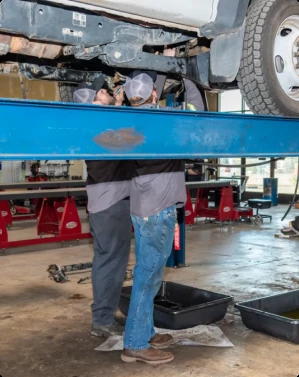Explore the impact of tire pressure on fuel efficiency in heavy-duty trucks. Learn how under-inflated tires increase rolling resistance, reduce fuel efficiency, and strain the engine. Discover the benefits of properly inflated tires, including improved fuel efficiency, extended lifespan, and overall cost savings. Get insights into monitoring and maintaining tire pressure through regular maintenance, prompt leak addressing, and Tire Pressure Monitoring Systems (TPMS). Understand industry best practices and regulations for safety, compliance, and environmental impact. Navigate the road with efficiency, reduced costs, and a commitment to safety and sustainability in the commercial trucking industry. For tire repairs and services, click here!
Tire pressure plays a crucial role in determining overall fuel efficiency. Understanding the relationship between tire pressure and fuel consumption is paramount for those in the trucking industry. The pressure within a heavy-duty truck’s tires has a direct impact on fuel efficiency, affecting various aspects of the vehicle’s performance.
Effects of Under-Inflated Tires on Fuel Consumption
The saying “proper inflation is prevention” holds especially true for heavy-duty trucks. Underinflated tires create challenges and can significantly impact fuel consumption.
Increased Rolling Resistance
One of the primary consequences of under-inflated tires is the surge in rolling resistance. Trucks with low tire pressure experience more friction between the tires and the road, requiring additional energy to propel the vehicle forward. This heightened resistance translates directly into increased fuel consumption, as the engine must work harder to overcome the impediment caused by insufficiently inflated tires.
Reduced Fuel Efficiency and Engine Strain
The correlation between under-inflated tires and reduced fuel efficiency is a critical concern. Beyond the increased rolling resistance, low tire pressure places an additional strain on the engine. The engine is forced to compensate for the inefficient energy transfer, leading to higher fuel consumption per mile traveled. This not only escalates operational costs but also accelerates wear and tear on the engine, potentially shortening its lifespan.
Benefits of Properly Inflated Tires
Understanding the pitfalls of under-inflated tires emphasizes the need for a proactive approach to tire maintenance. Properly inflated tires offer many advantages beyond fuel efficiency, making them a linchpin in the quest for an optimized heavy-duty truck operation.
- Improved Fuel Efficiency: Maintaining the recommended tire pressure is a simple yet powerful strategy for enhancing fuel efficiency. Trucks with properly inflated tires experience reduced rolling resistance, allowing the engine to operate more efficiently. This not only conserves fuel but also contributes to a greener, more sustainable fleet operation.
- Extended Tire Lifespan: Optimal tire pressure isn’t just about fuel efficiency; it’s also about preserving the tires’ longevity. Properly inflated tires distribute the vehicle’s weight evenly, minimizing uneven tread wear. This not only extends the lifespan of the tires but also reduces the frequency of replacements, leading to substantial cost savings for trucking companies.
- Overall Cost Savings: The financial implications of maintaining proper tire pressure are significant. The upfront investment in tire maintenance pales in comparison to the long-term savings derived from improved fuel efficiency and extended tire lifespan. For truck owners and fleet managers, the equation is clear: proper tire inflation equates to operational cost-effectiveness.
Monitoring and Maintaining Tire Pressure
Regular Tire Maintenance
Establishing a routine for tire maintenance is paramount. Regularly check and adjust tire pressure according to manufacturer recommendations. This practice not only ensures optimal fuel efficiency but also identifies potential issues before they escalate, preventing costly repairs and downtime.
Addressing Leaks Promptly
Tire leaks, no matter how small, can significantly impact tire pressure over time. Promptly address any leaks, and consider investing in high-quality tire sealants to mitigate the risk of slow leaks. Proactive leak management is a cornerstone of effective tire maintenance.
Tire Pressure Monitoring Systems (TPMS)
Integrating Tire Pressure Monitoring Systems (TPMS) has become a game-changer for heavy-duty trucking. These systems provide real-time data on tire pressure, enabling proactive maintenance and minimizing the risk of under-inflated tires. While the initial investment may seem substantial, the long-term benefits far outweigh the costs.
Industry Best Practices and Regulations
Exploring existing industry best practices and regulations related to tire pressure is essential for aligning fleet operations with these standards.
- Compliance with Industry Standards: Understanding and adhering to industry standards regarding tire pressure is a non-negotiable aspect of responsible fleet management. Compliance not only fosters a culture of safety but also positions trucking companies to reap the benefits of optimized fuel efficiency.
- Safety Considerations: Beyond fuel efficiency, adhering to tire pressure regulations directly contributes to overall safety on the road. Properly inflated tires enhance vehicle stability, reduce the risk of blowouts, and promote a safer driving environment for truckers and other road users.
- Environmental Impact: In an era where environmental sustainability is a global priority, maintaining optimal tire pressure aligns with broader initiatives to reduce carbon footprints. By maximizing fuel efficiency, heavy-duty trucks contribute to a greener transportation industry, enhancing the industry’s reputation and social responsibility.
Conclusion
By acknowledging the consequences of under-inflated tires, embracing the benefits of proper inflation, implementing proactive monitoring and maintenance practices, and aligning with industry best practices and regulations, the commercial trucking industry can navigate the road ahead with increased efficiency, reduced costs, and a commitment to safety and sustainability.
For more information on our tire repairs and services, click here!


